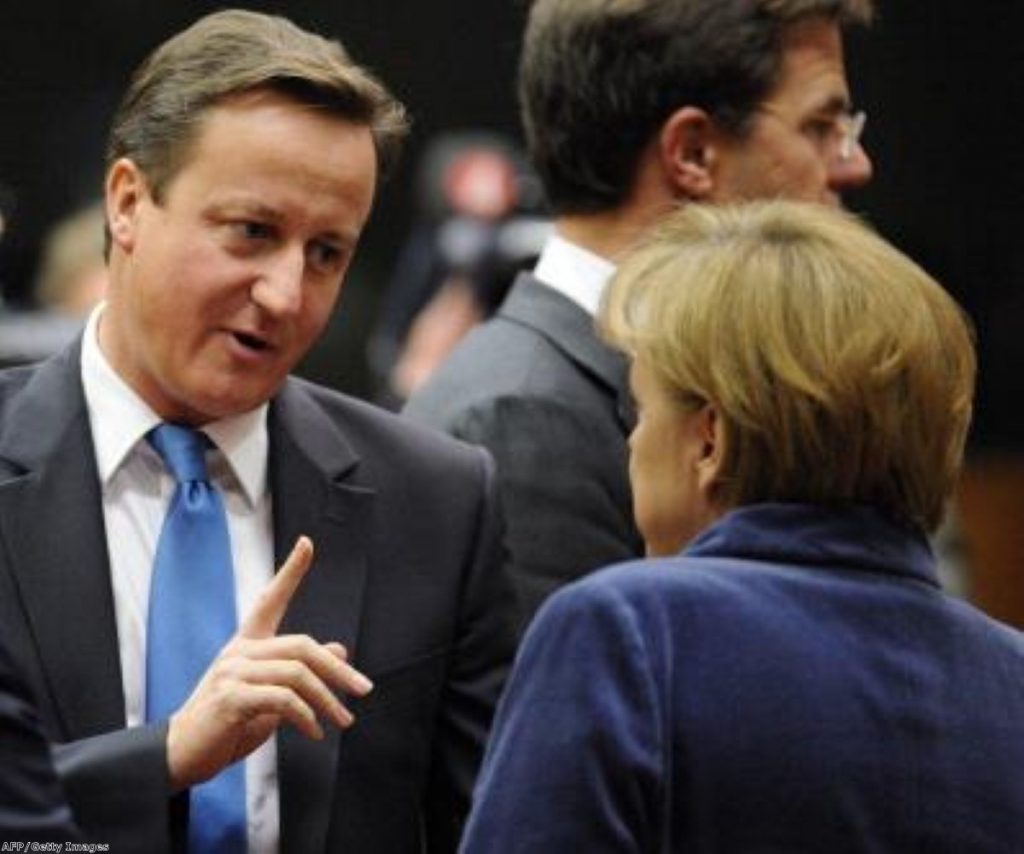David Cameron shouldn’t rely on Angela Merkel to save his EU reforms
By Edward McMillan-Scott
Angela Merkel's stay at Chequers for David Cameron's birthday today will probably be the last time the two leaders get together before the British prime minister presents his renegotiation demands to all EU leaders in December.
It remains unclear exactly what those demands are. In his speech at the conclusion of the Conservative party conference, Cameron hardly mentioned the EU, saying only that Britain was not interested in "ever-closer union".
It's also doubtful how receptive Merkel will be to those demands. The two recent books about Cameron – Cameron at 10 by Anthony Seldon and Peter Snowdon and Call Me Dave by Michael Ashcroft and Isabel Oakeshott – are threaded with references to Cameron's not always straightforward relations with Merkel, and in particular her disdain for his decision to quit the mainstream and dominant conservative/Christian Democrat European People's Party (EPP) of which she is the senior figure.


The decision to quit was a pledge in his 2005 leadership campaign. Cameron had caved in to a delegation of 'Better off out' Conservative MPs, who said that the EPP was too federalist' Instead, they insisted, an alternative alliance comprising 'real' conservatives, especially from the 2004 EU intake in Central and Eastern Europe, could be formed. When this new alliance – the European Conservatives and Reformists – was created after the 2009 Euro-election with 'a bunch of homophobes, anti-Semites and climate-change deniers' (as Nick Clegg later described them in a TV leaders debate) I objected and was expelled from the Conservative Party.
As Cameron at 10 describes it 'The move pleased Eurosceptics while causing dismay in European capitals, notably Berlin, and led to an angry Angela Merkel withdrawing the head of the Konrad Adenauer Stiftung political foundation in London, Thomas Bernd Stehling’.
An aide to Merkel is reported in Call Me Dave as saying that, "despite the warmth of their personal relationship, Merkel believes Cameron has made a series of serious diplomatic errors, and is still paying the prices for quitting the EPP… she thought he had blundered". The aide elaborates: "We saw it as a big mistake. The EPP was and remains an indispensable forum where leaders of the conservative parties meet regularly to forge common policies and prepare key decisions."

On the Today programme this morning, Gideon Rachman, chief foreign affairs commentator for the Financial Times said that Cameron may be placing too much reliance on Markel’s capacity to deliver. Call Me Dave describes Cameron's attempt to block the EPP's candidate for president of the European Commission – Jean-Claude Juncker – last summer as a 'humiliation'. Cameron at 10 goes into more detail about his initial reliance on Merkel, although I was told at an early stage that the EPP leaders, including Merkel, would support their man. Cameron's insistence on a vote mystified EU diplomats as it isolated him completely.
Cameron has built up an unprecedentedly close personal relationship with Merkel, with they and their families repeatedly staying in each others' residences. However, the EU's determination to stabilise the Eurozone as the Greek debt crisis deepened in 2011 with the treaty-based 'Fiscal Compact' caused an early rift, not only with Merkel and other EU leaders but also with his Liberal Democrat coalition partners.
Cameron at 10 reviews this saga, concluding 'Harm is done, however, to Cameron's vision of a consistent policy towards Europe. As his team take stock … they realise that they had boxed themselves into a corner with their 'Berlin or bust' strategy. If he is to use it again, he will have to ensure that he has a far stronger relationship with Merkel: he has yet to learn fully how to play her.'
More importantly for Cameron is how Merkel will receive his demands for EU reform and changes in the UK's relationship in December. These have somewhat diminished since his Bloomberg speech of January 2013. Specific questions about what they now constitute have usually been received with the standard line that 'we don't want to give a running commentary' on negotiations.
In any event, as the opposing camps on the EU referendum set out their stalls, it is worth recalling that the referendum is not on Cameron's reforms, but on Britain's membership of the EU itself – a far more important matter than any possibly negative and probably reversible reforms.
Edward McMillan-Scott was an MEP for Yorkshire & The Humber 1984-2014 (Conservative until 2010, then LibDem) and is a Patron of the European Movement
The opinions in Politics.co.uk's Comment and Analysis section are those of the author and are no reflection of the views of the website or its owners.

